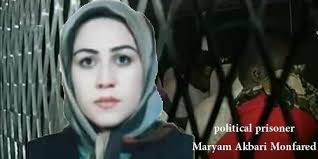
- Calling on the Iranian authorities to release Maryam Akbari Monfared immediately and unconditionally, as she is a prisoner of conscience whose conviction is based on an arbitrary interference with her privacy, family and correspondence;
- Calling on them to provide her with immediate and continued access to the medical care she needs outside prison and protect her from torture and other ill-treatment, which the denial of medical care can amount to;
- Urging them to stop the harassment and persecution of families of the victims of 1988 mass executions and respect their rights to truth, justice and reparation, including by conducting a thorough, effective and independent investigation and bringing to justice those responsible in fair proceedings without recourse to the death penalty.
PLEASE SEND APPEALS BEFORE 15 DECEMBER 2016 TO:
Head of the Judiciary
Ayatollah Sadegh Larijani
Salutation: Your Excellency
Prosecutor General of Tehran
Abbas Ja’fari Dolat Abadi
Salutation: Your Excellency
And copies to:
President
Hassan RouhaniPlease send your appeals to the care of diplomatic representatives accredited to your country, listed below. If there is no Iranian embassy in your country, please mail the letter to the Permanent Mission of the Islamic Republic of Iran to the United Nations, 622 Third Avenue, 34th Floor, New York, NY 10017, United States. Please insert local diplomatic addresses below:
Name Address 1 Address 2 Address 3 Fax Fax number Email Email address Salutation Salutation
Please check with your section office if sending appeals after the above date.
Additional Information
Since 2015, Maryam Akbari Monfared has suffered from pain in her joints. However, the authorities did not transfer her to a specialist medical doctor outside prison until August 2016. When she was finally allowed to see one, paid for by her family, she was diagnosed with rheumatoid arthritis, an autoimmune disease. Despite being initially given permission for a second appointment, the authorities have since told her family that they will not take her to her scheduled appointment. They have also said that they would no longer take her to the specialist whom she sees every three months for her thyroid problems, raising concerns that she will not be able to have her prescriptions renewed and adjusted.
Maryam Akbari Monfared was arrested on 31 December 2009, several days after the demonstrations that took place during the religious day of Ashoura on 27 December 2009 and were the last mass demonstrations to occur following the disputed presidential election in June 2009. Maryam Akbari Monfared has said that she did not take part in the Ashoura demonstrations. Her arrest was part of a wave of arrests that followed the Ashoura demonstrations, targeting those whose relatives were members of banned groups, particularly the PMOI. The Iranian authorities sought to blame banned groups, particularly the PMOI, for the unrest. The majority, if not all, of those charged with links to the PMOI had relatives in the Camp Ashraf in Iraq (see From protest to prison: Iran one year after the election,https://www.amnesty.org/en/documents/MDE13/062/2010/en/).
Maryam Akbari Monfared’s sister Roghayeh and brother Abdolreza were among an estimated 5,000 political prisoners who were cut off from the outside world in July 1988, and subsequently executed in secret and without trial, and dumped into mass, unmarked graves. Most of those executed were political prisoners, including prisoners of conscience, who had already spent several years in prison, serving the sentences they had been given by the Revolutionary Courts. Some had already completed their sentences but had not been released because they had refused to make statements of repentance (see Iran: Violations of Human Rights 1987-1990, https://www.amnesty.org/en/documents/mde13/021/1990/en/). In an open letter leaked from prison in October 2016, Maryam Akbari Monfared wrote: “Three of my brothers and one of my sisters were executed in the 1980s… My youngest brother Abdolreza was 17 years old when he was arrested for distributing PMOI literature and sentenced to three years in prison. The authorities refused to release him for years after he completed his sentence and executed him in 1988… My other brother Alireza was arrested on 8 September 1981 and tried and executed 10 days later… On the seventh night of mourning for my brother Alireza, security forces raided our house and arrested a number of guests as well as my mother and sister, Roghieh. My mother was released after five months but my sister was sentenced to eight years in prison. She was executed in August 1988 even though she was a year away from the end of her sentence.”
Following the submission of her complaint, the Associate Prosecutor of Evin Prison told Maryam Akbari Monfared’s family: “Such complaints are of no use. They would only make her conditions in prison more difficult and impede her release or access to [prison] leave.” The official added: “What does she want to know? Those who executed her brothers and sister have either died or become elderly and her brothers and sister are probably buried in Khavaran [a deserted piece of land in south Tehran].” In September 2016, an audio recording was published for the first time of a meeting in 1988 between senior officials involved in the mass executions and Ayatollah Hossein Ali Montazeri, a senior cleric who lost his status as Ayatollah Ruhollah Khomeini’s successor because of his principled opposition to the executions. Those heard in the audio include: Mostafa Pour-Mohammadi, the current Minister of Justice; Hossein-Ali Nayyeri, the current head of the Supreme Disciplinary Court for Judges; Morteza Eshraqi, a current attorney at law; and Ebrahim Raissi, the current head of one of Iran’s most wealthy foundations, Astan Qods-e Razavi. In the audio file, Ayatollah Montazeri is heard saying: “The greatest crime committed in the Islamic Republic, for which history will condemn us, has been committed at your hands, and in the future your names will go down in history as criminals.”
Name: Maryam Akbari Monfared












 Posted in
Posted in 











